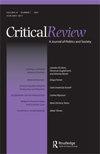什么是阴谋论,为什么它很重要?
IF 1.7
3区 社会学
Q4 POLITICAL SCIENCE
引用次数: 6
摘要
摘要人们越来越担心,我们已经进入了一个“后真相”时代,在这个时代,我们每个人都会在另类和社交媒体的帮助和怂恿下,随心所欲地相信自己的选择,为精品消费创造另类现实。相信另类现实的一个主要例子据说是接受“阴谋论”——这个词经常被用作贬义词,用来指控阴谋论,这些阴谋论显然是荒谬的,只有精神错乱的人才会相信。然而,这份起诉书中经常涉及的认识论标准——“明显”虚假的标准——在其应用中引入了主观性,因为对一个人来说明显虚假的东西对另一个人来说可能是常识。这不仅仅是老生常谈;大量研究表明,人们的政治信仰,尤其是对阴谋论的接受或拒绝,在很大程度上往往是由党派、意识形态和其他先验决定的。本文章由计算机程序翻译,如有差异,请以英文原文为准。
What Is a Conspiracy Theory and Why Does It Matter?
ABSTRACT Growing concern has been expressed that we have entered a “post-truth” era in which each of us willfully believes whatever we choose, aided and abetted by alternative and social media that spin alternative realities for boutique consumption. A prime example of the belief in alternative realities is said to be acceptance of “conspiracy theories”—a term that is often used as a pejorative to indict claims of conspiracy that are so obviously absurd that only the unhinged could believe them. The epistemological standard often involved in this indictment, however—the standard of “obvious” falsity—invites subjectivity in its application, because what is obviously false to one person can be common sense to another. This is not just a truism; considerable research suggests that people’s political beliefs, in general, and their acceptance or rejection of conspiracy theories in particular, tends in large part to be determined by partisan, ideological, and other priors.
求助全文
通过发布文献求助,成功后即可免费获取论文全文。
去求助
来源期刊

Critical Review
POLITICAL SCIENCE-
CiteScore
1.30
自引率
12.50%
发文量
17
期刊介绍:
Critical Review: A Journal of Politics and Society is a political-science journal dedicated to advancing political theory with an epistemological bent. Recurrent questions discussed in our pages include: How can political actors know what they need to know to effect positive social change? What are the sources of political actors’ beliefs? Are these sources reliable? Critical Review is the only journal in which the ideational determinants of political behavior are investigated empirically as well as being assessed for their normative implications. Thus, while normative political theorists are the main contributors to Critical Review, we also publish scholarship on the realities of public opinion, the media, technocratic decision making, ideological reasoning, and other empirical phenomena.
 求助内容:
求助内容: 应助结果提醒方式:
应助结果提醒方式:


